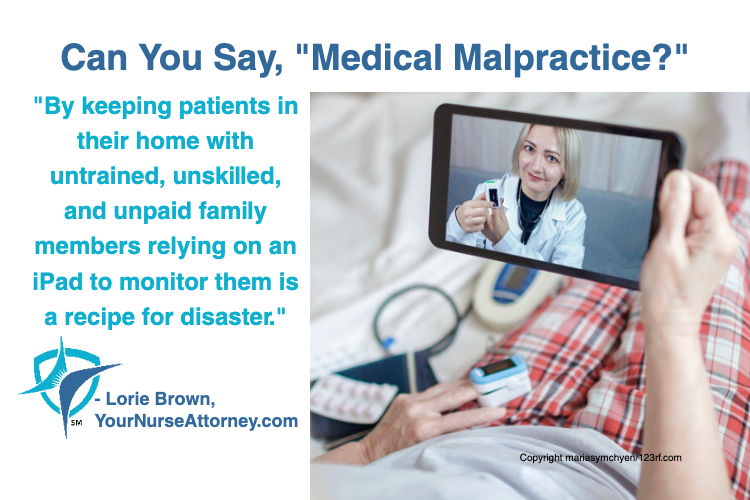There is a new trend sweeping the nation called “hospital-at-home” which are hospital organizations that provide hospital level care in the patient’s home as a full substitute for acute hospital care.
Nurses are up in arms about this because they believe that this will decrease the need for nurses in the hospital setting while putting those getting the home care at risk. Proponents say this provides more nurses in facilities where the hospital-at-home solution will not work.
According to a Johns Hopkins study comparing similar hospitalized patients, the hospital-at-home patients experience better outcomes, lower risks of developing delirium, lower rates of mortality, decreased use of restraints and better satisfaction to the patient and their family while keeping the patient in their own home.
Also, there is a cost savings compared to traditional inpatient care and lower average length of stay. However, this type of program does not address whether there is a decrease in medical malpractice claims as a result.
Nothing can replace the services of a registered nurse. By keeping patients in their home with untrained, unskilled, and unpaid family members relying on an iPad to monitor them is a recipe for disaster.
Nothing replaces the hands-on assessment of a nurse and, more importantly, nothing replaces a nurse’s intuition, that feeling when one walks into a room and instantly senses that something is wrong.
What if a patient is suffering a stroke, heart attack or pulmonary embolus? By the time a first responder can arrive and remove the patient to the hospital, it may be too late.
It is interesting that these articles say that there are lower rates of mortality given that emergency care is miles away.
In addition, hospitals take a dim view of babies being born at home with the service of a midwife. But what is the difference here? It is that mothers in the past always had babies at home until our modern health care system became the overwhelming alternate option.
The difference here is that these patients are sick and require hospital care yet are being managed at home.
What if a patient needs a CT scan? No one can come out to a home to do this.
Again, while I love the idea that patients can stay at home, there are reasons for a hospital and that primary one is for nursing care. Replacing nursing care with someone on an iPad to monitor patients, to me is nothing more than babysitting.
While hospital-at-home does allow physicians to perform an assessment online, they cannot hear chest sounds, they cannot feel the skin turgor, they cannot check reflexes, perform neurochecks or cranial nerve evaluation.
While I like the creativity in having new ways to care for patients, I believe this particular area is a disaster waiting to happen which will lead to an increased number of malpractice claims.
However, the hard part would be proving those claims because the patient is not being properly monitored so if something happens, we cannot know if it could have been assessed sooner.
What are your thoughts about Hospital at Home? Let me know in the comments below.









Sandy says
There are positives and negatives. Being home in a familiar environment is always a plus. And with the vaccine mandate and nurses leaving the hospital I personally am afraid to go to the hospital for any treatments. However for acute care I believe my family would be overwhelmed in caring for me. You have to decide exactly how you want to be treated and what your problem is
Sue Rosen says
With so much publicity about covid , people are generally afraid to be in a hospital. Not to also remind you, but I will, the nursing shortage, that is it’s own pandemic leads to a lot of distrust on care. Insurance coverage denies claims, people simply cannot afford what you are suggesting. Multiple issues have created the hospital at home, that’s the reality that must be closely looked at. Sometimes it’s the only alternative that people have.
Sara Nevil says
Perhaps this is where home health care could help fill the gap. There could at least be nurses, even nurse practitioners who could help visit and provide trained assessments which may prevent emergency situations. Nurse practitioners can order diagnostic tests though may not be able to do immediately. This may not be ideal, but lately hospital beds have been scarce and it can be very scary to be in the hospital alone without loved ones near.